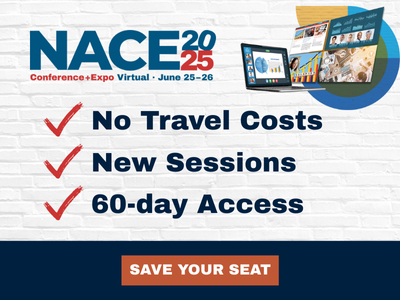As many career professionals would agree, career readiness skill development is an important part of being able to effectively communicate key durable skills. The earlier we introduce these skills to our students, the better they will be able to identify their strengths and challenges and strategize how to continue their growth toward career success.
Among employers taking part in NACE’s latest Job Outlook report, more than half reported using skills-based hiring practices, especially in the interviewing and screening processes.1 Knowing the importance employers place on this, we need to look at how we present this material to students and ask if they can connect the skill to the experience. Career centers drive this work, but what if students are unable to connect their experiences adequately to skills? How can we expand our reach, especially when our teams are small (but mighty!)? How can we ensure that all students have an equitable opportunity to expand and enhance these skills?
The answer is: We need to encourage our leaders to support a career-ready campus and infuse skill development college-wide. The question is: How?
Start Where You Are
Start where you are. Use what you have. Do what you can. - Arthur Ashe
I have this quote in my office, and I often use it to inspire me to stop overthinking and just start. Let me break down how I was inspired to just get started.
What is Career Readiness?
NACE defines career readiness as “a foundation from which to demonstrate requisite core competencies that broadly prepare the college educated for success in the workplace and lifelong career management.” The eight core competencies are Career & Self Development, Communication, Critical Thinking, Equity & Inclusion, Leadership, Professionalism, Teamwork, and Technology.I don’t sit at the table where the big decisions get made, but I do have great leaders above me who do. I started simply by researching the data available to me as a NACE member. The career readiness resource page and the NACE Community are two of my favorite places to visit when looking for evidence and examples. If less than 40% of employers reported that they are screening candidates by GPA this year, how can we be sure our students’ skills and competencies shine in an interview?2 I feel lucky to have a dean and provost who are extremely supportive and enthusiastic for this initiative, but I knew that data would help them drive the conversation and get others on board so we could move forward the idea of infusing career readiness college-wide.
Anyone can start this work. If you are not at the decision-making table, find someone who is and focus first on getting them on board. Build your team of career champions so they can help move the work forward. You will need facts and evidence to do that. Find your strategic goals, academic master plans—whatever documents your institution uses—and make sure your idea ties into them. Make short- and long-term goals (the S.M.A.R.T. method is a favorite of mine!). This will not happen overnight.
Use What You Have
At my institution, the career center oversees a lot of programs. We started to incorporate career readiness skills into everything we did so we could assess what worked and what didn’t. (A word of advice: Don’t be discouraged if something doesn’t do what you hoped it would. Challenge yourself to rethink your idea.)
We started by connecting the career readiness competencies to what already existed. We have some really terrific faculty partners who we work with on specific assignments and workshops, so we incorporated the career readiness competencies into those. In addition, my office manages the student employment program, so we integrated the competencies into those job descriptions. Once we saw how many places career readiness easily fit, we realized that the issue was not so much whether students were exposed to a specific skill (they were) but rather whether they were able to connect the skill to the experience and articulate it. That is where we put our focus.
We know that students want to learn and develop skills that will make them successful, but they face a lot of pressures and their time is limited. The only way we can really ensure equitable career development is to assist with the integration of key skills into courses and academic programs. I would challenge you to think one step ahead about how you can encourage a career-ready campus by integrating skill development into every one-on-one appointment offered by other departments, such as Student Life & Activities and Transfer Pathways.
We identified stakeholders by creating a career champions program for the 2023-24 academic year to highlight the great faculty and department partners we had and encourage and attract new partners. We were piloting what that might look like moving forward when a new provost was hired in January 2024. It turns out that the new provost was very familiar with NACE and its work around integrating career readiness. Following discussions with the new provost, we pivoted our career champions into a new idea—our Career Competencies Across the College program—and applied for an internal grant in April 2024. We secured funding in May 2024 to provide the training to faculty and staff in a variety of departments; all participants receive a small stipend for the time spent training and developing their implementation plans. In summer 2024, we created an application to gauge interest as well as level of knowledge in NACE and the competencies. Training began in September 2024. We have nine faculty and five administrators in our cohort, and all have now been through the NACE training designed to educate as well as help them brainstorm how best to weave this into their defined areas. Almost everyone had examples of what they were already doing that further proved the work is being done, but the connection to that development is sometimes the missing part for students. I’m excited to see what happens in the spring as we move toward implementation and hopefully a career ready campus!
Do What You Can
Listen to the feedback from your leaders. Look for creative ways to work toward your goals. Don’t be afraid to pivot.
Is budget an issue? Think about what you can do that is no-cost or low-cost. Are there grants available? Find your college grant writer and invite them to coffee so you can pick their brain! I promise you that grant writing is a skill that will take you far in your career.
Starting somewhere is better than not starting at all. Whatever you do, don’t be discouraged. Just because career readiness is not a priority this year for your institution, doesn’t mean it is not a priority. At the very least, you can build partners and encourage career conversations to happen outside the career center. Set a goal to get everyone using the same language about career readiness. This type of synergy will continue to make your students’ career-ready and successful in their future.
Endnotes
1 Job Outlook 2025 (2024, November), National Association of Colleges and Employers. Retrieved from https://naceweb.org/research/reports/job-outlook/2025.
2 Ibid.







